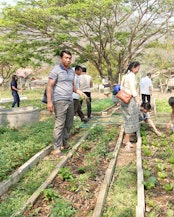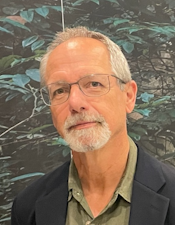Nature-positive land use and livelihood development

Nature-positive land use and livelihood development
- Our Objective
To restore forest landscapes and enhance local livelihoods, this project aims to co-design alternative land uses for monoculture cash cropping in Xayabury province, Laos, and Nan province, Thailand. In Xayabury province, the project supports agroforestry practices by building the capacity of local officials, communities, and youth. This includes research and development of value chains for cultivating non-timber forest products (NTFPs) that meet market demands. In Nan province, the Trees4All project mobilizes private financing through an online platform to help smallholders fund their forest restoration efforts.
- Figures
The project was launched on March 1, 2022 and is currently in progress.
Summary
In Xayabury, Laos, the project builds a comprehensive value chain to support agroforestry practices. Working with partners such as local schools, communities, the Xayabury Provincial Agriculture and Forestry Office, and the Kunming Institute of Botany, we are developing agroforestry pilot sites and providing agroforestry training to local officials and communities. At the same time, we are collaborating with these partners to identify Non-Timber Forest Product (NTFP) value chains and attract new business partners, enabling agroforestry to provide sustainable livelihoods and help restore degraded forest landscapes. In Nan, Thailand, the project crowdsources financing to fund smallholders who often lack resources to test and implement agroforestry practices.
Project Connections
- Part of the solutionscape
Ensuring forest stewardship and restoration at cash crop frontiers
Timeline
Two Years of Environmental Education in Laos: It truly does take a village
Project Update December 17, 2025
When the first co-design meeting took place in Nam Tien, Xayabury, back in November 2023, no one could have predicted how the journey would transform schools, teachers, and communities. Over the past two years, one lesson has become crystal clear: it truly takes a village to cultivate environmental education. In our case, it took diverse stakeholders coming together with a shared purpose.
Trees4All: 12,200 New Trees with an Impressive 94% Survival Rate
Project Update February 28, 2024
In the rural Santisuk District of Nan Province in Northern Thailand, the Wyss Academy for Nature is supporting the Regional Centre for People and Forests (RECOFTC) through the Trees4All initiative. This collaboration aims to work with local farmers to reshape reforestation and landscape restoration approaches. Over two years (2022-2024), the concerted efforts of 99 dedicated farmers have seen 12,200 trees planted, boasting an impressive 94% survival rate. This collective endeavor is breathing new life into a landscape previously transformed from an ecologically diverse forested area to maize monoculture during Thailand’s cash crop boom in the 1980s. Through Trees4All, Santisuk District is transforming Nan’s barren landscapes into a diverse ecosystem once again. Transparency, collaboration, and innovation Traditional reforestation approaches in Thailand were initially driven by corporate social responsibility (CSR) initiatives, with private sector companies engaging in tree planting primarily for photo opportunities and good press. However, these activities often lacked transparency and accountability, with minimal to no follow-up or longer-term funding, nor local community engagement to ensure the survival of the planted trees. Trees4All delivers a new transparent approach to reforestation that positions farmers and local communities center stage. Under Trees4All, farmers take responsibility for planting and nurturing trees. Working with RECOFTC, farmers gain invaluable skills in tree growth monitoring, care, and maintenance. Experienced Trees4All farmers are further empowered to become district-level mentors and pass on their knowledge to newcomers eager to join Trees4All. Crucially, the native species planted are carefully selected by local farmers to provide reforestation and additional livelihood benefits. For instance, ‘Yang Na’ trees (Dipterocarpus alatus) contribute to reforestation and offer the opportunity for high-valued Caesar mushroom (Amanita hemibapha) cultivation once matured, with the fallen leaves serving as a natural fertilizer. Furthermore, RECOFTC actively explores alternative livelihood options with farmers while waiting for the trees to mature, such as beekeeping. Central to Trees4All is an innovative finance mechanism designed to enhance transparency and accountability through accessible and traceable data. Private individuals or corporate donors provide financing for tree planting and maintenance, and Trees4All farmers are trained to measure and record tree data in the Trees4All smartphone app. This app is linked to the Trees4All Website which features reporting data. Through the website, donors can locate trees they financed from geographic coordinate information and the tree map, monitor their growth, estimate carbon absorption potential, and receive reports on planting outcomes. This mechanism effectively bridges the gap and fosters transparency and trust between trained farmers possessing land and individuals or entities with financial resources. Consequently, public engagement and donations surge, boosting farmers' confidence and commitment to Trees4All. Donations have increased from just over 400,000 baht in the rainy season of 2022 to over 1.5 million baht by January 2024. Looking Towards the Future The Trees4All initiative's lessons will be instrumental in advancing Wyss Academy for Nature’s broader work in Southeast Asia's forest frontiers. Trees4All demonstrates that when provided with the necessary skills and resources, local communities can be empowered to enhance biodiversity and improve livelihoods through collaborative approaches. Trees4All is sowing the seeds of transformation, nurturing sustainable ecosystems, and empowering communities to shape a greener, more resilient future for generations to come.
Preserving trees by using trees
Project Update February 13, 2024
While the Wyss Academy for Nature’s focus in Southeast Asia currently lies in Nam Thien, Laos, since March of 2022, we have also been active in the neighboring Nan province of northern Thailand. The landscape in Nan province shows degradation due to unsustainable farming practices over the past three decades. An unprecedented demand for cash crops during the last decade is replacing natural forests.In order to conserve these natural forests, their economic value must be enhanced – and local communities involved, so they can be sustained over the long term.Starting in March of 2022, we partnered with the Center for People and Forests (RECOFTC) and with the Trees4All initiative to develop an innovative finance mobilization mechanism for planning and managing multipurpose trees in Nan. In addition, alternative income streams for local communities are being developed. By the end of 2023, over 100 farmers had joined us and about 10,000 trees were planted. The established community-led tree nursery provides seedlings, and an online portal makes it possible to monitor the planted trees.
Finding value in the forest
Project Update January 9, 2024
Nam Thien is among 200 provincial and district-level protected areas in Laos. These zones and forest frontiers hold significant potential for nature conservation, but also face substantial challenges and pressure. Provincial and district authorities tasked with protecting these zones lack the capacity, resources, and enforcement power to protect and manage them sustainably. These areas are often perceived as free spaces, where uncontrolled agricultural practices can endanger both ecosystems and local livelihoods. One potential answer to this problem is to enhance the value of such areas through economic development, by establishing them as a source of new products that do not rely on deforestation: so-called non-timber forest products (NTFP).To document and share local and scientific knowledge about NTFPs, starting in July 2022, the Wyss Academy for Nature co-developed the Pha Khao Lao online platform with local partners. It now includes information on the biology, distribution, and possible uses of over 1,400 native species. This ensures the preservation and sharing of critical knowledge and provides a foundation for the development of NTFP value chains. Together with the Centre for Development and Environment (CDE) at the University of Bern, Switzerland, we have also established a new partnership with Swisscontact and identified promising NTFP production chains for further development in 2024.
Team
- Project contactProject contact
Dr. Horst Weyerhäuser
Hub Director
Other Projects in this Solutionscape
Stewardship at forest frontiers—Co-designed knowledge and engagement
Stewardship at forest frontiers—Co-designed knowledge and engagementStakeholder network analysis for systemic transformation
Stakeholder network analysis for systemic transformation








